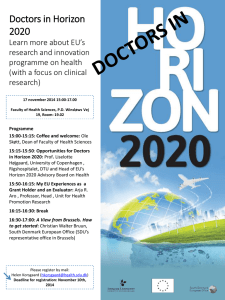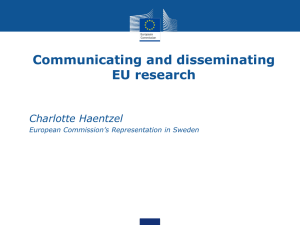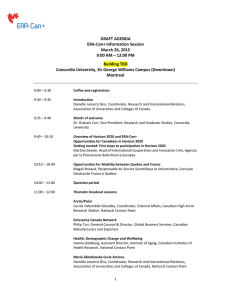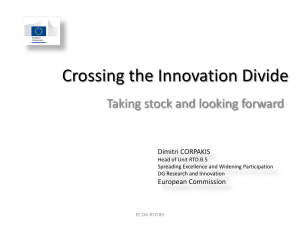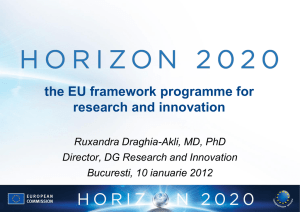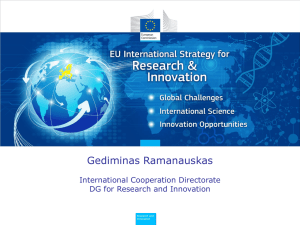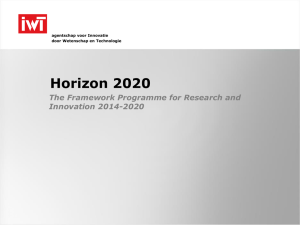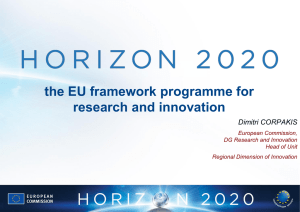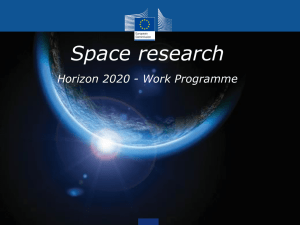The Framework Programme for Research and Innovation (2014
advertisement
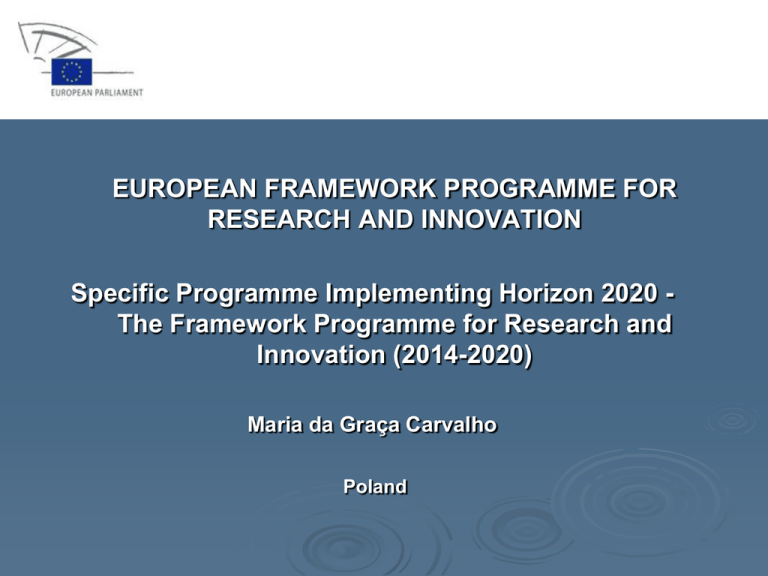
EUROPEAN FRAMEWORK PROGRAMME FOR RESEARCH AND INNOVATION Specific Programme Implementing Horizon 2020 The Framework Programme for Research and Innovation (2014-2020) Maria da Graça Carvalho Poland Content Multipolar world in research and innovation Horizonte 2020 – the 3 pilars Horizontal issues • Simplification, Synergies with Structural Funds, Widening participation, Youth employment, other relevant aspects Next steps Conclusions MULTIPOLAR WORLD IN RESEARCH AND INNOVATION Multipolar world in research and innovation Multipolar world in all sectors ans also in science 80% of researchers work outside Europe 69% of patent applications are made outside Europe 75% of GERD is executed in other parts of the world (Gross Expenditure on Research and Development) EU`s world share in GERD has diminished by 7.6% over the previous 6 years EU`s world share of patent application has declined 14.2% over the previous 6 years Multipolar world in research and innovation EU-27 is the largest producer of scientific publications in the world (EU 37% US 31%). However the EU contributes less than the US to high impact publications (US 1.45% EU 0.97% contribution to the 10% most cited publications) China`s share of world scientific publications has more than doubled within six years and is now larger than that of the Japanese 7th Framework-Programme Framework Programme for Research, Technological Development and Demonstration Budget 52.000 M€ 2007-2013 Enormous strategic importance for the development of innovation, competitiveness and therefore employment of the European area MS Participation in the FP7 EC contribution (€M) Applicants UK UK DE DE FR FR IT IT ES NL NL ES BE SE SE BE EL FI AT DK FI AT DK EL PL PT PT PL HU HU CZ CZ IE IE RO RO BG BG SI SI SK EE EE CY LT LT CY SK LV LV MT MT LU LU 0 1.000 2.000 2008 3.000 2007 4.000 5.000 0,0 500,0 1.000,0 2008 2007 1.500,0 2.000,0 Motivation: Weaknesses Under investment in science and research Unsatisfactory framework conditions Fragmentation and excessive bureaucracy and red tape Motivation: Strengths Europe has world leading researchers, entrepreneurs and companies A set of deeply embedded values and traditions, a dynamic culture of creativity and diversity The largest internal market in the world A society actively engaged in emerging and developing countries across the globe HORIZON 2020 “8th Framework-Programme” for Research, Technological Development, Demonstration and Innovation Horizon 2020 Principles 5 key principles: 1. A Trust based funding system 2. Excellence based criteria “Stairway to Excellence” 3. A chain from frontier research, to technological development, demonstration, valorisation of results and innovation 4. Synergies with Structural Funds for capacity building 5. Employment of young scientists Horizonte 2020 Financing European Parliament proposed doubling of the budget (52.000M€ to 100.000M€ ) European Comission proposed 87.740M€ Final budget depending on negotiations between Parliament, Council and Commission Horizon 2020 Three Pilares Europe 2020 priorities International cooperation European Research Area Shared objectives and principles Societal Challenges Health, demographic change and wellbeing Food security, sustainable agriculture, marine and maritime research, and the bioeconomy Secure, clean and efficient energy Smart, green and integrated transport Climate action, resource efficiency and raw materials Inclusive, innovative and secure societies EIT will contribute to addressing these challenges Industrial Leadership Leadership in enabling and industrial technologies ICT Nanotechnologies Advanced materials Biotechnologies Advanced manufacturing and processing Space Access to risk finance Innovation in SMEs Excellence in the Science Base Frontier research (ERC) Future and Emerging Technologies (FET) Skills and career development (Marie Curie) Research infrastructures Simplified access Common rules, toolkit of funding schemes Coherent with other EU and MS actions Horizon 2020 Excellent science Excellent science proposed funding (million euro, 2014-20) European Research Council 13.268 Future and Emerging Technologies 3.100 Marie Curie Actions 5.572 Research Infrastructures 2.478 Spreading Excellence and Widening Participation (new) Recommendations Excellent science Increase the number of ERC “synergy grants” Increase the funding of Marie Curie actions Extend the FET instrument to FEST Recommendations Excellent science • New suggestion from the Parliament Spreading Excellence and Widening Participation: Twinning and networking measures Building synergies with Structural Funds Recommendations Excellent science Spreading Excellence and Widening Participation Twinning and networking measures Linking in a competition emerging institutions and centres of excellence in less developed or less experienced regions to leading international counterparts elsewhere in Europe Launching a competition for the foundation of internationally competitive research centres in cohesion regions: the candidates for the competition should be teams each comprising an innovative but still less developed region and an internationally recognised centre of excellence elsewhere in Europe Establishing 'ERA Chairs' to attract outstanding academics to institutions with a clear potential for research excellence, in order to help these institutions fully unlock this potential and thereby create a level playing field for research and innovation in the European Research Area Recommendations Excellent science Spreading Excellence and Widening Participation Twinning and networking measures Attribution of "Return Grants" to excellent researchers currently working outside of Europe and who wish to work in Europe or to researchers already working in Europe who wish to move to a less performing region Support complementary agreements signed among organisations beneficiaries of the collaborative research projects with other entities with the objective of facilitating training opportunities (namely doctoral and postdoctoral positions) Making available doctoral and postdoctoral fellowships, as well as advanced training fellowships for engineers for accessing all international research infrastructures in Europe, including those managed by international scientific organisations Recommendations Excellent science Spreading Excellence and Widening Participation Twinning and networking measures Strengthening successful networks aiming at establishing high quality institutional networking in research and innovation. Particular attention will be paid to COST in order to promote activities to identify and connect "pockets of excellence" Developing specific training mechanisms on how to participate in Horizon 2020, taking full advantage of existing networks such as the National Contact Points Setting up an online marketplace where intellectual property can be advertised in order to bring together the owners and users of IPR Recommendations Excellent science Spreading Excellence and Widening Participation Building synergies with Structural Funds Conferring a "seal of excellence" on positively evaluated ERC, Marie Sklodowska-Curie or collaborative project proposals that have not been able to achieve funding because of budgetary limitations. National and regional funds might thus be used to contribute to the funding of those projects Conferring a "seal of excellence" to completed projects in order to facilitate funding of the follow up (e.g. pilot scale, demonstration projects or valorisation of research results) by national, regional or private sources Supporting the development and monitoring of smart specialisation strategies. A policy support facility will be developed and policy learning at regional level will be facilitated through international evaluation by peers and best practice sharing Horizon 2020 Industrial leadership Industrial leadership proposed funding (million euro, 2014-20) Leadership in enabling and industrial technologies (ICT, nanotechnologies, materials, 13.781 biotechnology, manufacturing, space) Access to risk finance Innovation in SMEs 3.538 619 Recommendations Industrial leadership To improve definition of: demonstration, pilot actions, technological deployment, flagship projects To take into account the circumstances of different sectors when defining the target of 15% for SMEs To develop a mechanism that is at once simpler, faster and more efficient: “inovgation vouchers” To foster innovation by introducing “pre-comercial procurement” To ease access to loans, guarantees and other form of risk finance To build standardisation into technological development projects Horizon 2020 Societal Challenges Societal challenges proposed funding (million euro, 2014-20) Health, demographic change and wellbeing 8.033 Food security, sustainable agriculture, marine and maritime research & the bioeconomy 4.152 Secure, clean and efficient energy 5.782 Smart, green and integrated transports 6.802 Climate action, resource efficiency and raw materials 3.160 Inclusive, innovative and secure societies 3.819 Horizon 2020 Societal Challenges 1. HEALTH, DEMOGRAPHIC CHANGE AND WELLBEING 1.1. Understanding the determinants of health, improving health promotion and disease prevention 1.2. Developing effective screening programmes and improving the assessment of disease susceptibility 1.3. Improving surveillance and preparedness 1.4. Understanding disease 1.5. Developing better preventive vaccines 1.6. Improving diagnosis 1.7. Using in-silico medicine for improving disease management and prediction 1.8. Treating disease Horizon 2020 Societal Challenges 1. HEALTH, DEMOGRAPHIC CHANGE AND WELLBEING 1.9. Transferring knowledge to clinical practice and scalable innovation actions 1.10. Better use of health data 1.11. Improving scientific tools and methods to support policy making and regulatory needs 1.12. Active ageing, independent and assisted living 1.13. Individual empowerment for self-management of health 1.14. Promoting integrated care 1.15. Optimising the efficiency and effectiveness of healthcare systems and reducing inequalities through evidence based decision making and dissemination of best practice, and innovative technologies and approaches Horizon 2020 Societal Challenges 2. FOOD SECURITY, SUSTAINABLE AGRICULTURE, MARINE AND MARITIME RESEARCH AND THE BIOECONOMY 2.1. Sustainable agriculture and forestry 2.2. Sustainable and competitive agri-food sector for a safe and healthy diet 2.3. Unlocking the potential of aquatic living resources 2.4. Sustainable and competitive bio-based industries Horizon 2020 Societal Challenges 3. SECURE, CLEAN AND EFFICIENT ENERGY 3.1. Reducing energy consumption and carbon footprint through smart and sustainable usage 3.2. Low-cost, low-carbon electricity supply 3.3. Alternative fuels and mobile energy sources 3.4. A single, smart European electricity grid 3.5. New knowledge and technologies 3.6. Robust decision making and public engagement 3.7. Market uptake of energy innovation, empowering markets and consumers Horizon 2020 Societal Challenges 4. SMART, GREEN AND INTEGRATED TRANSPORT 4.1. Resource efficient transport that respects the environment 4.2. Better mobility, less congestion, more safety and security 4.3. Global leadership for the European transport industry 4.4. Socio-economic research and forward looking activities for policy making Horizon 2020 Societal Challenges 5. CLIMATE ACTION, RESOURCE EFFICIENCY AND RAW MATERIALS 5.1. Fighting and adapting to climate change 5.2. Sustainably managing natural resources and ecosystems 5.3. Ensuring the sustainable supply of non-energy and nonagricultural raw 5.4. Enabling the transition towards a green economy through ecoinnovation 5.5. Developing comprehensive and sustained global environmental observation and information systems Horizon 2020 Societal Challenges 6. INCLUSIVE, INNOVATIVE AND SECURE SOCIETIES 6.1. Inclusive societies 6.2. Innovative societies 6.3. Secure societies Recommendations Societal Challenges Pilot Platform for the promotion of best practices, sharing information and networking among researchers with projects in different inniciatives (eg. JTIs, PPPs, ERC and Industrial Leadership and Societal Challenges pilars) To split “inclusive, innovative and secure societies” into two challenges Horizontal Issues SIMPLIFICATION Simplification Rules for participation It is necessary to simplify the mechanisms of European financing programmes of research and innovation 2 approaches: 1. Simplification of financing and administrative aspects of project financing 2. Reinforcement of the technical and scientific evaluating process Simplification Rules for participation A single set of simpler participation rules Simpler funding rates Easier access to applications Simple evaluation criteria Simpler rules for grants Simpler rules Fewer, better targeted controls and audits Simplification Rules for participation VAT considered an eligible cost for institutions that cannot recover it from their own state fiscal systems Direct costs will be reimbursed at a 100 percent New rules to facilitate the recruitment of young researchers to universities No time-sheets for personnel working full time on a project A single set of rules for all instruments of H2020 Synergies between the FP and the SF Upstream from Horizon 2020 the structural funds can finance: equipment, human resource development, the creation of clusters in the priority areas of Horizon 2020 and as a source of small grants given for the preparation of proposals to be submitted to Horizon 2020 ERC, Marie Curie or collaborative projects that meet the criteria of excellence but cannot be funded due to lack of European funds Synergies between the FP and the SF Downstream from Horizon 2020 the structural funds can finance : or co-finance the follow up to Horizon 2020 research projects (e.g. pilot scale and demonstration projects); to valorise research results in such a way as to encourage easy access to knowledge or to facilitate the deployment of the resulting knowledge in terms of its direct economic or societal use Youth employment Increase employment for young scientists Deployment of rules to facilitate the recruitment of young people in universities Other relevant aspects Balance between small focused projects and large integrative projects Sound governance at all levels: at comitology level in the Programme Committees but also at the overall level of a Horizon 2020 Advisory Group and coordination with stakeholders Strong international cooperation in strategically defined priorities with key international partners, NEXT STEPS NEXT STEPS Ongoing: Negotiations on EU budget 2014-20 (including overall budget for Horizon 2020) 28/11: Parliament votes in ITRE Committee H2020 “package” Jan/2013: Start of the negotiations on Horizon 2020 Mid 2012: Final calls under 7th Framework Programme Mid 2013: Adoption of legislative acts by Parliament and Council on Horizon 2020 2014: Horizon 2020 starts CONCLUSIONS Conclusions • Funding programme well structured and accessible for all • Efficient and appropriate funding mechanisms • Excellence across all Horizon 2020 and “Stairway to Excellence” • Synergies and complementarities with Structural Funds Thank you www.gracacarvalho.eu mariadagraca.carvalho@ europarl.europa.eu
